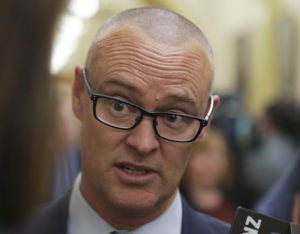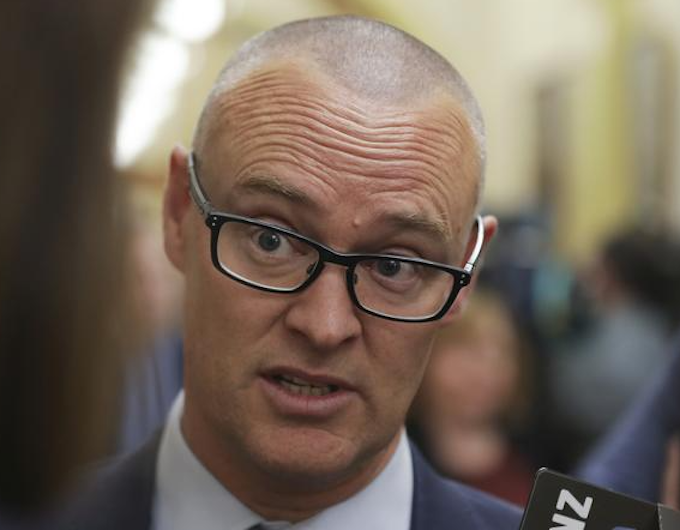Analysis by Bryce Edwards.

Is David Clark the best possible Minister of Health to be leading New Zealand through the Coronavirus crisis? Confidence in Clark has plummeted with today’s revelation that the Health minister made another recreational trip during the lockdown that appears to breach the Government’s own rules.
The Prime Minister has decided not to accept his resignation, citing the “massive disruption” this would cause to the Government’s attempts to combat the spread of Covid-19 – see Eleanor Ainge Roy’s report today for the Guardian: New Zealand health minister demoted after beach visit broke lockdown rules.
The PM has been clear she would have liked to have got rid of Clark, saying “Under normal conditions, I would sack the minister of health. What he did was wrong, and there are no excuses.”
RNZ’s political editor Jane Patterson says Ardern may still have to sack Clark, especially if his continued role means the Government’s ability to enforce the lockdown and rules is compromised – see: Health Minister David Clark’s lack of judgement a distraction at time of great crisis.
For example, Patterson says, he can obviously no longer front health messages about lockdown rules, and she asks whether keeping Clark in place will “prove to be too much of a distraction for Jacinda Ardern at such a crucial time?” She also points out that “Even the fact he’s obviously only still a minister because New Zealand is in the middle of the crisis is hardly confidence-inducing and further undermines his authority and credibility.”
The problem for Ardern is the lack of obvious replacements. Patterson explains: “None of the associate ministers, Jenny Salesa, Peeni Henare or the Greens Julie Anne Genter has the experience or seniority to take over as the lead minister. Bringing in another minister Ardern could trust to do the job would require them getting up to speed very quickly with a complex portfolio at the most extraordinary of times, plus any knock on implications for that minister’s own portfolios.”
According to Herald political editor Audrey Young, Clark’s sacking is now just a matter of time, and it’s “very unlikely” he can stay in his role until the election – in fact he may have to go before the crisis is over. She says “Ardern or Finance Minister Grant Robertson could take over the portfolio themselves as a short-term bridging position” – see: Why Health Minister David Clark can’t last (paywalled).
Young says Ardern will be “incandescent with fury” at the “no-win position” Clark has put her in, forcing her to deal with a political crisis in the middle of a health crisis, which is “unforgiveable”. Ardern knows keeping Clark on could make her look weak, and she could have just gone for the easy option of firing him, but that would not be “in the best interests of resolving the health crisis”.
Stuff political journalist Henry Cooke also suggests the more pragmatic choice would have been to get rid of Clark: “Politically the right option would be to simply accept it and send him to the backbench. That rips the band-aid off. You don’t have to spend the next two days batting off questions about Clark”, but putting in a new minister would be very difficult – see: Jacinda Ardern should fire David Clark as soon as this is over.
And who would replace Clark? Cooke discusses the problem: “There isn’t really an heir apparent to take on the role, as there is absolutely no way that Ardern would hand it to either of the associates: Health is too important of a portfolio to be handed to a Green MP like Julie Anne Genter, or someone with as little clout as Jenny Salesa.”
Cooke says it’s appropriate that Ardern has taken action against her minister, as the issue wasn’t about to blow over: “This is not an apologise and move on sort of sin. This is the Health Minister breaking and undermining an extremely stringent set of rules his own government has put in place for health purposes. It fulfils every stereotype of politicians as people who are happy to write rules but not abide by them.”
What’s more, being Health Minister, Clark should have been entirely on top of the new rules: “He should know these rules inside-out. The Government is currently intervening in the public’s lives to a degree no Government has done in a lifetime, with the full power of the police behind them – they need to be absolutely squeaky clean on this stuff themselves.”
Cooke also raises a question that others have been commenting on – why Clark hasn’t been part of the Government’s crisis response in Wellington: “You’d be forgiven for forgetting that Clark was the health minister still, given he’s fronted a tiny amount of the daily press briefings and has been holed up in Dunedin ever since the lockdown began. Many politicians would see this as the month that would make their career; Clark decided it would be the month for him to ruin his. His own top civil servant is now a national celebrity while he’s an embarrassment to his boss.”
Clark’s decision to depart Wellington is also discussed today by Newsroom’s Sam Sachdeva: “From the outset, it seemed odd that Clark had not based himself in Wellington for the duration of the lockdown. For all that technology can offer, there is a reason why Ardern chose not to return to Auckland” and it speaks “volumes of Ardern’s confidence in him that she was happy with that arrangement” in which he worked from his Dunedin home – see: Clark’s career all but over after lockdown breaches.
More generally, Sachdeva argues Clark was never well suited to be Health minister: “He came into the job with no real health experience to speak of; while his mother was a GP, the ‘Dr’ honorific in front of his name comes from a PhD in theology rather than any medical qualifications. Clark has exercised questionable judgment in the past too, most notably a decision to head overseas for a family holiday in the days before a nationwide nurses’ strike in mid-2018. More generally, he has never seemed entirely comfortable fielding difficult questions from opposition MPs or the media, frequently giving the impression of a deer in the headlights.”
Clark’s performance during the Coronavirus crisis had already been questioned much earlier on. A number of bloggers and commentators suggested he wasn’t taking the pandemic seriously enough or communicating it well – see, for instance, Martyn Bradbury’s report on one of his Breakfast TV appearances in early March: David Clark vs John Campbell – worst interview ever.
About the same time, Chris Trotter argued Clark needed to step up and take more control of the crisis and fronting the Government’s response. He implored the PM to work out whether she needed him by her side, or whether she needed a new Minister of Health: “Having an effective and trustworthy Health Minister standing at her side for the duration of the fightback is essential. If that role isn’t one David Clark feels up to playing, then he, or Jacinda, should urgently arrange for it to be given to somebody else” – see: A helluva job: the political machinations of the coronavirus crisis during an election year.
Trotter warned the PM that Clark wasn’t up to the job and might cause problems: “In terms of potential cock-ups, the Prime Minister needs to keep a particularly close watch on her Health Minister, David Clark. A more ‘political’ politician than Clark would already have stepped forward to make the challenge of Covid-19 his own. Unfortunately, Clark has an unfortunate reputation for being ‘guided’ almost entirely by his officials. Certainly, he has displayed a consistent unwillingness to be held to account by the news media.”
Then when the mountain-biking controversy broke, a number of commentators suggested he might need to go, because his slip-ups undermined the Government’s all-important lockdown rules and messages. For instance, Heather du Plessis-Allan argued the PM needed to take action: “If she wants the rest of us to take these rules seriously for the next three weeks, she’s going to have to set an example” – see: David Clark doesn’t deserve it, but he should be fired.
Similarly, see Liam Hehir’s Maybe axing Clark would be unfair. But what about any of this is fair?.
At that stage Du Plessis-Allan also raised the question of whether Clark was actually relevant to the management of the crisis: “The fact that he’s in Dunedin when the country’s response to the biggest health crisis in 102 years is being run out of Wellington tells you everything.”
Criticisms of Clark were dismissed last week by a Press newspaper editorial, which said those calling for him to be sanctioned or sacked were “mischief-making” and seem “petty and contrived” – see: Making mountain bikes out of molehills.
However, the editorial argued that Clark’s bigger mistake was his decision to leave Wellington during the crisis: “There is much more substance to the criticism that at a time when New Zealand is facing its greatest health crisis in a century, the Government’s Minister of Health should have been in Wellington and making himself available to the media alongside Ardern and Finance Minister Grant Robertson. While there is a logic behind limiting the number of messengers, and putting the best communicators and most senior ministers in front of the public, the Health Minister’s absence from the capital during the crisis seems unusual.”
Finally, former Act MP Heather Roy stands up for David Clark and argues that “going to the beach with his family in their bubble on day 3 of lockdown when everyone was settling into a new normal is hardly a cardinal sin”. She says that the controversy is the sorry outcome of the fact that “We’re constantly being told what to do, or what we shouldn’t be doing” – see: New Zealand’s narks, the new normal.








